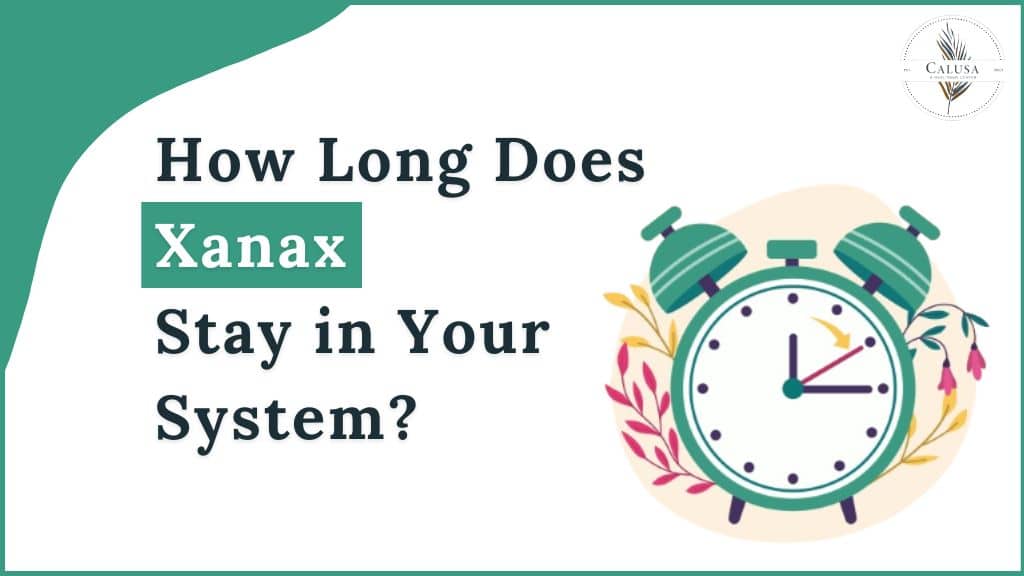Xanax (alprazolam) is a prescription medication belonging to the benzodiazepine class. Commonly used to treat anxiety and panic disorders, it works by calming the central nervous system. While Xanax is effective for many, understanding how long does Xanax stay in your system is crucial for various reasons.
This article delves into the factors affecting Xanax elimination, detection windows for different drug tests, and additional considerations.
Understanding Xanax and its Mechanism
Xanax falls under the category of benzodiazepines, which function by amplifying the impact of gamma-aminobutyric acid (GABA), an essential neurotransmitter. GABA serves as a communicator in the brain, primarily tasked with suppressing nerve signals. Adequate levels of GABA induce sensations of tranquility and ease, while insufficient levels correlate with heightened anxiety and excessive brain function.
Xanax functions as a positive allosteric modulator of the GABA type A receptor (GABA-A receptor), which is crucial in calming nerve cells. Rather than directly unlocking the cell, Xanax attaches to a separate site on the receptor, facilitating GABA’s binding and enhancing its calming effects. This mechanism reduces neuronal activity, resulting in a calming effect on the central nervous system (CNS). Hence, understanding how long does Xanax stay in your system is essential for managing its effects.
Factors Affecting Elimination Time
Several factors can influence how long does Xanax stay in your system, including:
-
Age:
As individuals grow older, the metabolism of their bodies generally exhibits a gradual decline. This can lead to a longer elimination time for Xanax in older adults compared to younger individuals.
-
Liver Health:
The liver plays a primary role in metabolizing Xanax. If you have underlying liver problems, it may take longer for your body to eliminate the drug.
-
Body Weight and Composition:
People with higher body fat percentage tend to store Xanax for a longer duration compared to those with lower body fat. This is because fat tissue can store the drug for a while before releasing it back into the bloodstream.
-
Genetics:
Genetic variations can affect how efficiently the body metabolizes certain medications including Xanax, and how long does Xanax stay in your system.
-
Kidney Function:
While the kidneys play a lesser role in eliminating Xanax compared to the liver, impaired kidney function can still slightly prolong elimination time.
-
Metabolic Rate:
Individuals with a faster metabolism typically experience a more rapid clearance of Xanax from their system due to the increased rate at which their body processes and eliminates the drug.
-
Urinary pH:
Highly acidic urine can expedite the elimination of Xanax from the body as it promotes a more efficient breakdown and excretion of the drug.
-
Dosage and Frequency:
The amount of Xanax taken and how often it’s consumed significantly impact how long it stays in your system. Higher doses and more frequent use will naturally take longer to eliminate.
-
Other Medications:
Certain medications can interact with Xanax, affecting its metabolism and elimination time. It’s crucial to inform your doctor about all medications you’re taking before starting Xanax.
Detection Windows for Drug Tests
The duration Xanax remains detectable in the body varies depending on the type of drug test employed, influencing the answer to the query of how long does Xanax stay in your system. The tests include:
-
Urine Test:
This is the most common type of drug test used for Xanax detection. In most cases, a urine test can detect Xanax for up to 4 days after the last dose. However, heavy users or those with the mentioned factors may have a longer detection window, potentially up to a week.
-
Blood Test:
A blood test is typically used for a shorter detection window compared to a urine test. It can generally detect Xanax within 1-6 days after the last dose.
-
Saliva Test:
A saliva test offers a relatively short detection window for Xanax, usually up to 2.5 days after the last dose.
-
Hair Follicle Test:
Hair follicle tests have the longest detection window for Xanax, potentially tracing it back for up to 90 days after use. However, hair follicle tests are not commonly used for detecting Xanax due to their higher cost and wider detection window, which may not be relevant for most purposes.
Benefits and Potential Drawbacks
By enhancing gamma-aminobutyric acid (GABA) activity, Xanax produces several beneficial effects for individuals with anxiety disorders:
- Reduced Anxiety: It helps alleviate excessive worry and fear associated with anxiety.
- Improved Sleep: By promoting relaxation, Xanax can ease insomnia and enhance sleep quality.
- Muscle Relaxation: It can also help reduce muscle tension often experienced during anxiety episodes.
However, it’s essential to be aware of potential drawbacks associated with Xanax use:
- Side Effects: Drowsiness, dizziness, fatigue, and difficulty concentrating are some common side effects to conclude from how long does Xanax stay in your system.
- Impairment: Xanax can impair coordination and cognitive function, making it unsafe to drive or operate machinery under its influence.
- Dependence and Withdrawal: Long-term use can lead to dependence, and abruptly stopping Xanax can cause withdrawal symptoms like anxiety, insomnia, and seizures.
Techniques for Accelerating Xanax Metabolism in the Body
While there’s no foolproof method to expedite Xanax elimination from the body, implementing specific strategies can aid in supporting the natural detoxification processes. These approaches, such as staying hydrated, exercising regularly, and consuming a nutritious diet, can potentially shorten the duration of Xanax’s presence in your system, influencing the answer to the question, “how long does Xanax stay in your system.” Conferring with a healthcare professional for personalized recommendations and avoiding alcohol and caffeine can additionally optimize the process, enabling faster clearance of the medication from your body.
-
Hydrate:
Staying hydrated by drinking plenty of water can aid in flushing out Xanax from the body, as it promotes increased urine production, facilitating the elimination of the drug through the urinary system. Adequate hydration supports the body’s natural detoxification processes, potentially expediting the removal of Xanax.
-
Eat Healthy:
A balanced diet provides nutrients for optimal metabolism. A balanced diet supplies essential nutrients that support optimal metabolism, aiding in the efficient breakdown and elimination of substances like Xanax from the body. Ensuring a varied intake of vitamins, minerals, and macronutrients promotes overall health and can enhance the body’s ability to process medications effectively.
-
Exercise Regularly:
Engaging in regular exercise can boost your metabolic rate, potentially aiding in the faster elimination of substances like Xanax from your system. It’s advisable to consult with a doctor before starting any new exercise regimen to ensure it’s safe and appropriate for your individual health needs.
-
Get Enough Sleep:
Adequate rest facilitates efficient bodily functions, including metabolism and detoxification processes, which may contribute to eliminating substances such as Xanax from the body. Prioritizing quality sleep supports overall health and can optimize the body’s ability to process medications influencing how long does Xanax stay in your system.
FAQ
1. Are there any medications that can speed up the clearance of Xanax from the body?
There are no medications specifically intended to speed up Xanax clearance from the body. However, some drugs that induce liver enzymes may indirectly affect Xanax metabolism, potentially increasing its elimination rate. Always consult a healthcare professional before combining medications to avoid potential interactions or adverse effects.
2. Can alcohol consumption impact the duration of Xanax in your system?
Yes, drinking alcohol can affect how long Xanax stays in your system. Combining alcohol with Xanax may slow down its metabolism, leading to a longer duration of action and an increased risk of adverse effects. It’s essential to avoid alcohol while taking Xanax and to consult with a healthcare professional regarding any potential interactions.
3. Can Xanax show up in a drug test after a single use?
Yes, Xanax can potentially show up in a drug test after a single use, depending on factors such as the sensitivity of the test and the individual’s metabolism. While Xanax has a relatively short half-life, it can still be detected in urine, blood, saliva, or hair for a certain period after ingestion.
Conclusion
In conclusion, understanding how long Xanax stays in your system is necessary for individuals prescribed this medication and those concerned about its effects. Factors such as metabolism, dosage, frequency of use, and the type of drug test employed all play a role in determining Xanax’s duration in the body.
Individuals can better manage their medication usage and ensure safe and effective outcomes by being aware of these factors and implementing strategies to support detoxification processes. Ultimately, consulting with a healthcare professional for personalized guidance is crucial for those seeking to optimize their health while taking Xanax, addressing the question of “how long does Xanax stay in your system” effectively.
If you have any concerns or questions about Xanax or its duration in your body, don’t hesitate to reach out to us by visiting our website https://calusarecovery.com/ or by calling us at 866-939-6292 to consult with a healthcare professional for personalized guidance and support.










